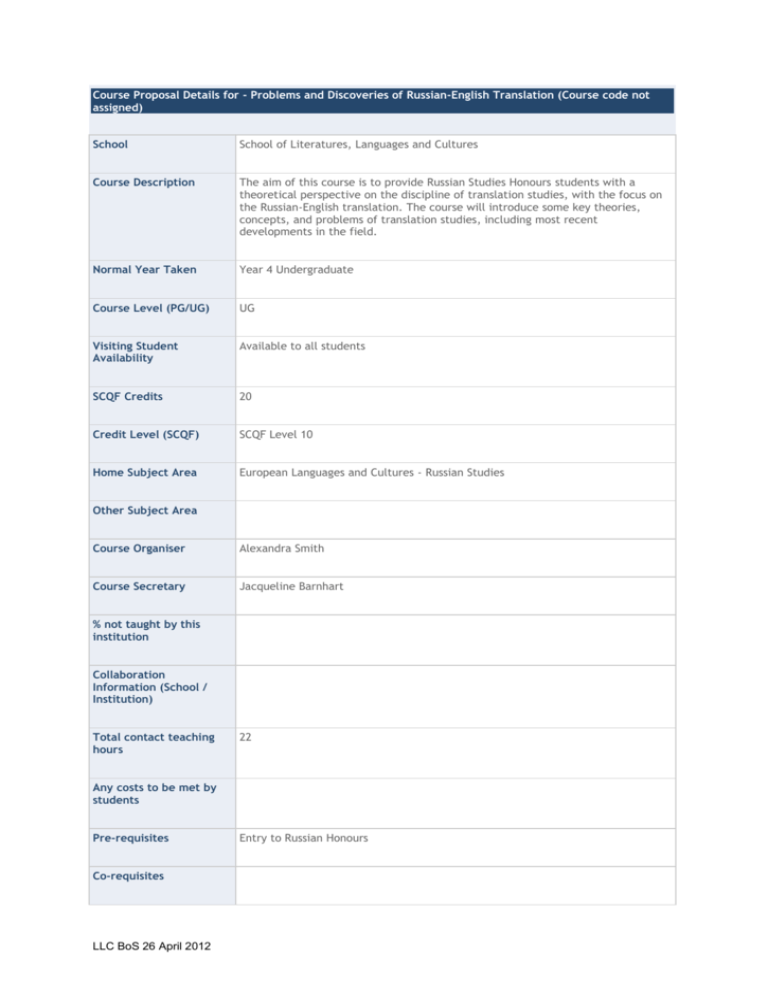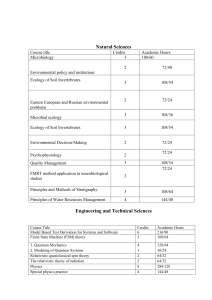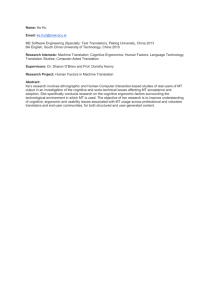Problems and Discoveries of Russian
advertisement

Course Proposal Details for - Problems and Discoveries of Russian-English Translation (Course code not assigned) School School of Literatures, Languages and Cultures Course Description The aim of this course is to provide Russian Studies Honours students with a theoretical perspective on the discipline of translation studies, with the focus on the Russian-English translation. The course will introduce some key theories, concepts, and problems of translation studies, including most recent developments in the field. Normal Year Taken Year 4 Undergraduate Course Level (PG/UG) UG Visiting Student Availability Available to all students SCQF Credits 20 Credit Level (SCQF) SCQF Level 10 Home Subject Area European Languages and Cultures - Russian Studies Other Subject Area Course Organiser Alexandra Smith Course Secretary Jacqueline Barnhart % not taught by this institution Collaboration Information (School / Institution) Total contact teaching hours 22 Any costs to be met by students Pre-requisites Co-requisites LLC BoS 26 April 2012 Entry to Russian Honours Prohibited Combinations Visting Student Prerequisites In order to be eligible to take 4th Year Options, Visiting Students should have the equivalent of at least two years of study at University level of the appropriate language(s) and culture(s) Keywords Fee Code (if invoiced at course level) Proposer Jacqueline Barnhart Default Mode of Study Classes & Assessment incl. centrally arranged exam Default delivery period Semester 1 Marking Scheme to be employed Common Marking Scheme - UG Honours Mark/Grade Taught in Gaidhlig? No Course Type Standard Summary of Intended Learning Outcomes/L01 By the end of the course students will understand what is required for building a successful translation theory capable of accounting for linguistic, cultural, and social difference (here, Russian and English). In addition, the students will appreciate the role of cross-linguistic comparison and learn to connect previously acquired language skills to theory. The course can be helpful to both those students of the Russian language who consider to practice translation as well as those students who are interested in translation from the academic standpoint. Learning Outcome 2 Learning Outcome 3 Learning Outcome 4 Learning Outcome 5 Special Arrangements Components of Assessment Exam Information LLC BoS 26 April 2012 One 2-hour examination (70%) One coursework assignment of approximately 2500 words (30%) Syllabus Academic Description Study Pattern Transferable Skills Study Abroad Reading Lists o Nabokov, V. (1966). The servile path, in On Translation (eds., A. Reuben and A. Brower), 97-110. Oxford: Oxford University Press. o Jakobson, R. (1971). On linguistic aspects of translation, in Theories of Translation. From Dryden to Derrida (eds., R Schulte and J. Biguenet), 144-151. Chicago: Chicago University Press. o Швейцер М. (1986). Теория Перевода. Москва: Наука. o Nabokov, V. (1992). Problems of translation. Onegin in English, in theories of translation. From Dryden to Derrida (eds., R. Schulte and J. Biguenet), 127-144. Chicago: Chicago University Press. o Zlateva, P. (1993). Translation as Social Action: Russian and Bulgarian Perspectives. London: Routledge. o Endrews, E. and E. Maximova (2010). Russian Translation. Theory and Practice. London: Routledge. LLC BoS 26 April 2012






